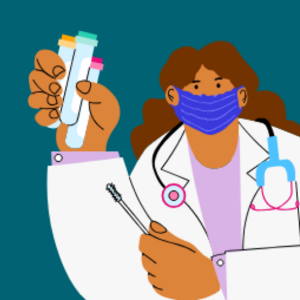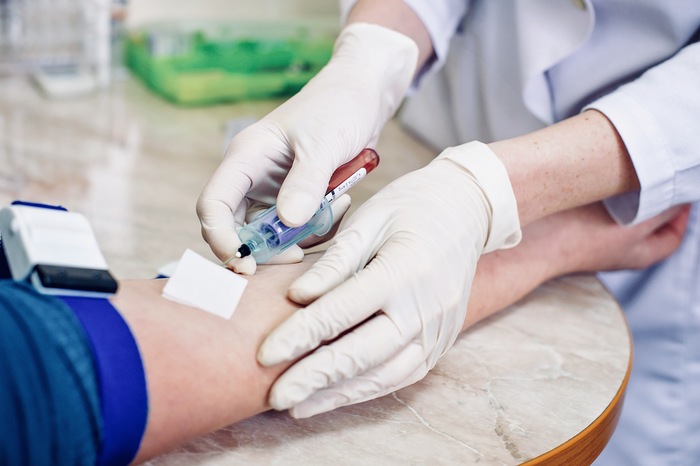
Ensure your health. Get tested today.
Convenient lab testing at your fingertips at more than 5,000 locations nationally. Consult with a doctor, or get tested on your own.

When you’re uninsured, you’re likely to keep a closer eye on all of your medical costs. However, staying informed about your potential medical expenses can be time-consuming, and it can also be difficult to find all the information you need in one place.
When you need get lab tests done, the cost of that lab test can vary depending on the type of collection sample (does it require you to pee in a cup, or do you need to have your blood drawn?), the type of test (does it require highly technical equipment to produce results, or can it be easily interpreted?), your geographic region, and each lab’s pricing schedule, according to research published in the Journal of the American Medical Association (JAMA).
Oftentimes, when you go to a healthcare provider or urgent care facility to get tested for potential health concerns, the lab tests themselves are not conducted on the premises but, instead, sent to a lab offsite. All of these factors go into determining the price of a lab test, according to JAMA
It’s important to know about blood test costs, and where to get blood work done without insurance.
Blood tests can provide a healthcare provider with valuable information when it comes to determining a diagnosis and treatment plan. So how much does a blood test cost when you don’t have insurance? Check out this helpful table, compiled with assistance from the Healthcare Bluebook, for a better idea of the cost of each common blood test.
Blood Test |
Price Without Insurance |
CBC |
Range: $6 to $28 |
BMP |
Range: $8 to $38 |
CMP |
Range: $9 to $45 |
Blood enzyme test |
Range: $11 to $58 |
Lipid Panel |
Range: $12 to $58 |
HbA1C |
Range: $10 to $51 |
TSH |
Range: $15 to $73 |
When you’re being evaluated in a healthcare setting, particularly if you have an unknown illness that is causing concerning symptoms, a healthcare provider will likely order more than one test, according to Medline Plus. For example, a CBC and CMP are often ordered together, as they can give a full picture of your health status and help rule out many emergent conditions on the spot. Also, if a test is abnormal, a follow-up test may be ordered, which will have an additional charge. For these reasons, it’s a good idea to plan for the potential of more than one blood test if you’re contemplating paying without insurance.
A huge variety of blood tests are available within the American medical system. However, according to the US National Library of Medicine, some blood tests are more commonly used. Here is a description of the most common tests, as adapted from the US National Library of Medicine.
This blood test evaluates the various components of your blood, including red blood cells, white blood cells, platelets, and hemoglobin. A CBC can be a helpful test to show if you have an infection (viral or bacterial), but it can’t determine which specific organism has caused the infection. A CBC can also be helpful if you are experiencing excessive bleeding or bruising, or if you have concerns about a low blood count (anemia).
This blood test evaluates certain components of your blood such as your blood sugar, calcium, phosphorus, sodium, chloride, and potassium. These chemicals are all crucial when it comes to your body’s ability to carry out basic cellular processes, and they can be a helpful way to determine if you are having a problem like dehydration, diabetes, breathing problems, kidney problems, or a specific electrolyte abnormality.
This blood test evaluates all the components of a BMP but also includes liver function tests. These tests can give a healthcare provider more information about the state of your liver, including whether it is inflamed, infected with a virus, or having difficulty performing its functions.
This is a category of bloodwork that can check for levels of proteins in your blood called enzymes. You may have an elevated enzyme known as troponin if you’ve had a heart attack. Alternatively, your creatine kinase enzyme level may be elevated if you’re experiencing a condition of severe muscle breakdown, known as rhabdomyolysis. These tests are more likely to be ordered within an emergency department or hospital setting, according to the National Institutes of Health (NIH).
A lipid panel measures the different types of fat molecules in your blood, such as triglycerides, high-density lipoproteins (HDL), and low-density lipoproteins (LDL). These levels can help provide a window into the state of your metabolism and fat utilization, both of which are tied to your risk of chronic diseases such as heart disease and diabetes.
This type of blood test might be performed to monitor your condition if you have a pre-existing diabetes diagnosis, or to make an initial diabetes diagnosis. The A1C test is a measure of the average level of your blood sugar over the past three months, according to the American Diabetes Association (ADA).
This type of blood test can help a healthcare provider determine the state of your thyroid regulation. If your thyroid stimulating hormone (TSH) level is too high, it might mean that your brain is trying to communicate to your thyroid gland to produce more thyroid hormone because the level of thyroid hormone in your blood is too low (a condition known as hypothyroidism), according to the US National Library of Medicine.
A herpes simplex virus test is a diagnostic procedure used to detect the presence of the herpes simplex virus (HSV) in the body, according to the NIH. They explain that it may be needed to confirm a suspected herpes infection, especially in cases of genital sores or other symptoms related to HSV. The test is typically done by collecting a swab sample from a sore or blister or by conducting a blood test to detect antibodies to the virus. The presence of HSV can indicate an active infection or a previous exposure to the virus. This information can help healthcare providers determine the appropriate treatment and management for the patient.
STD testing refers to the process of screening for sexually transmitted diseases (STDs) to detect the presence of infections such as chlamydia, gonorrhea, syphilis, HIV, herpes, and others, according to the Mayo Clinic. They note that it may be needed for sexually active individuals, who have multiple partners or engage in unprotected sexual activity. STD testing is typically done through a combination of blood tests, urine tests, swab tests, and physical examinations, depending on the specific STD being screened for. The results of these tests can help diagnose and treat STDs, prevent their spread, and promote overall sexual health and well-being.
A urinalysis is a diagnostic test that involves analyzing a urine sample to evaluate various aspects of health, including kidney function, urinary tract infections, diabetes, and other medical conditions, according to the Mayo Clinic. They note that a urinalysis may be needed for routine health screenings, diagnosing symptoms such as abdominal pain, back pain, frequent urination, or blood in the urine, monitoring certain medical conditions, or assessing overall health. The test is typically done by collecting a clean-catch urine sample and then analyzing it for color, clarity, odor, specific gravity, pH level, protein, glucose, ketones, bilirubin, and the presence of white blood cells, red blood cells, or bacteria. The results of a urinalysis can provide valuable information for diagnosing and managing various health conditions.
A Testosterone test is a blood test that measures the levels of testosterone in the body, according to the Mayo Clinic. They note that this test may be needed to diagnose conditions such as hypogonadism, infertility, erectile dysfunction, or delayed or early puberty in males, as well as to assess the causes of irregular menstrual periods, excessive facial and body hair, or infertility in females. The test is done by taking a blood sample, usually in the morning when testosterone levels are highest, and then analyzing the sample in a laboratory to determine the amount of testosterone present.
Most bloodwork is done outside the confines of a typical medical office. Many times blood is drawn at a provider's office and then sent for analysis to an outside lab. Sometimes a provider might just give you a prescription for a blood test and then you have to find a lab that can draw the sample. At Solv, we have urgent care locations nationwide that can provide you with high-quality, convenient, and affordable blood draws that will then be sent to a lab, and at times, even internal analysis performed on-site. Our partners are all highly skilled at making sure that you get precisely the evaluation you need—no more, and no less.
If you need to reduce the cost of bloodwork because you are currently uninsured, one of your best resources may be a free or subsidized clinic. According to the Healthcare Bluebook, paying cash upfront for blood tests may also help you reduce their cost. Additionally, according to HowMuchIsIt.Org, an online lab could be a cheaper option.
You may also want to ask your healthcare provider if the cost of bloodwork varies based on the test being performed. For example, if you need to have documentation of your diabetes risk (for an employer, insurer, or otherwise), then you might be able to get a cheaper glucose reading from a mere fingerstick blood assessment than from a full-fledged metabolic panel or A1C test.
Price transparency regarding the cost of blood tests refers to the clear and easily accessible information about the prices associated with different types of blood tests. This includes the specific costs for the tests themselves, as well as any additional fees or charges that may apply, such as processing fees or facility fees.
Having price transparency allows patients like you to compare costs between different healthcare providers and make informed decisions about where to get their blood tests done. It also helps in avoiding unexpected or hidden costs, enabling individuals to plan and budget for their healthcare expenses more effectively. Every urgent care facility, hospital, primary care clinic, and other source of healthcare should offer price transparency which offers you the opportunity to know your healthcare costs ahead of time.
The cost of a blood test without insurance can range from $6 to $73, depending on the specific test.
The cost can vary based on the type of sample, test, geographic location, and the lab's pricing schedule.
Bloodwork is often done outside of a typical medical office, with samples sent to an external lab for analysis.
You can reduce costs by using free or subsidized clinics, paying cash upfront, or using online labs.
Price transparency refers to clear and easily accessible information about the prices associated with different types of blood tests, helping patients compare costs and avoid unexpected charges.

Convenient lab testing at your fingertips at more than 5,000 locations nationally. Consult with a doctor, or get tested on your own.